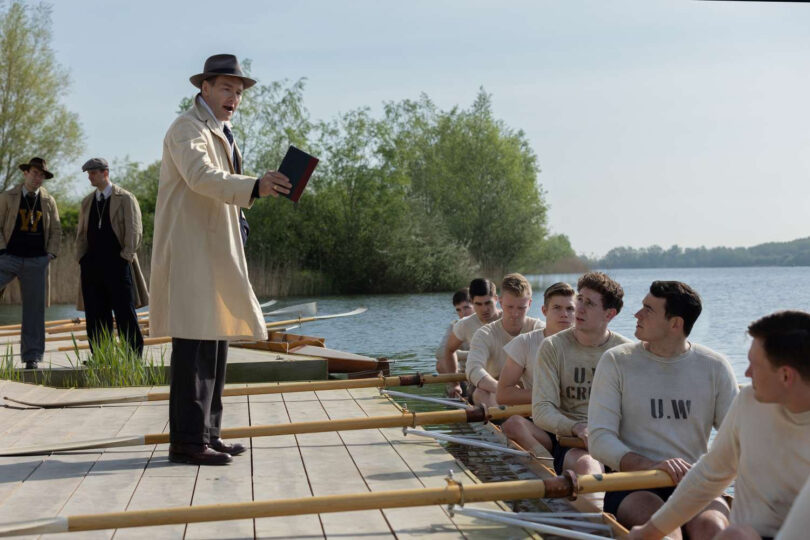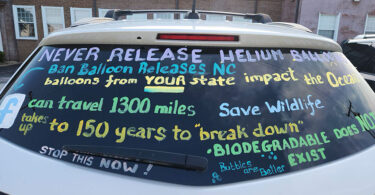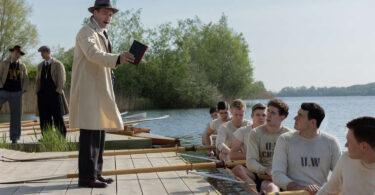Gail Arneke
The Boys in the Boat, a film directed by George Clooney. Screenplay by Mark L. Smith, based on the book of the same name by Daniel James Brown. Starring: Joel Edgerton as Coach Al Ulbrickson, Callum Turner as Joe Rentz, Peter Guiness as Joe Pocock, boat builder, Jack Mulherin as Donny, Hadley Robinson as Joyce, Joe’s girlfriend, Courtney Henggeler as Hazel Ulbrickson, Coach’s wife, Juydd James as Jesse Owens. Lots of other folks. This film is on Amazon Prime Video now.
This movie is a total throwback, a film based on a true story of an underdog sports team going for the gold against severe odds. It is beautifully filmed, accompanied by a lovely score, and exciting. It’s exciting although you can pretty much guess the ending, especially if you have researched the 1936 Olympics.
But it is a gracious and loving portrayal of a singular team and so reminiscent of an earlier brand of movie that it is a pleasure to watch. And you can learn a lot about the sport of rowing.
The movie starts in Seattle in about 1935. At the University of Washington we meet Joe Rentz, a freshman at the university and a victim of the Depression. He is living in an abandoned car, wearing ragged clothes and lining his shoes with newspaper. Somehow he has paid half of his first year’s tuition, but the other half is due in two weeks, and he doesn’t know where it might come from. There are no jobs available. Joe’s father abandoned his family when Joe was fourteen, and Joe has been on his own since.
Joe and his buddy learn that the rowing team is holding tryouts for its JV squad. Younger readers might want to consult a grandparent about what JV is. Hundreds of guys show up, as the team offers some pay and a room. Joe and his buddy make the team, and there is a lengthy montage of rowing training, interspersed with an exhausted Joe being pursued by the adorable Joyce, who manages to keep him awake in class and of course falls in love with him.
The gruff but understanding coach, Al Ulbrickson, picks Joe and his buddy for the JV eight. He advises that they must turn themselves into one highly coordinated team and work as one. The movie skips few true sports cliches, and somehow they are not trite but touching and in keeping with the bygone era shown. Coach tells his men that they will compete against “the best teams in the world,” and they will be ready for them. The answer from the team? “We won’t let you down, Coach.”
The team’s first challenge is in a regatta against their chief foe, California. The Cal and Washington coaches glare at each other from adjoining docks to demonstrate heated rivalry. Our boys win, setting a record, although they are still the JV squad.
Now we have a rivalry between the senior team and the JV. Coach risks his job to take the JV team to Poughkeepsie for a national regatta on the Hudson. The winner there will be invited to the Olympics. A bigwig at the university tells Coach “I hope you know what you’re doing.”
Well before going to New York, Joe sees his father on the street, selling wood. Dad asks him to go to work for him at a dollar a day and sneers at Joe when Joe refuses.
Of course the JVs win at Poughkeepsie. A radio announcer enthuses that they are “underdogs representing the underdog nation.” The other competitors are bluebloods who probably rowed before they walked and now attend Ivy League schools, and Navy, who we might hope to have done better in competition for a nautical skill.
Washington wins, but the Olympic Committee tells Coach that new rules require the team to come up with $5,000 extra for transportation and housing. The team and the school go on a massive hunt for the money. Even Joe’s father contributes to the campaign. Touchingly, the Sanford coach shows up minutes before the money deadline and makes up the difference between $5,000 and what has been raised.
It’s off to Hamburg then, with everyone turned out in spiffy Olympic blazers, white slacks, and boaters. The team meets Jesse Owens briefly and someone asks him if he’s running to beat Hitler. Owens replies that he’s doing it for the folks back home.
A moment of drama, as Donnie, one of the rowers, becomes sick and dehydrated and must stay in bed. Will it be Win One for the Gipper time? No, it won’t. Donnie, who for some reason doesn’t talk but is a great pianist, recovers enough to be back on the boat in time. Coach tells the team to “Row for your country; row for each other,” as they have really molded themselves into a team. Their coxswain has helped immeasurably in the team building. All we know about him is that Coach has given him “one last chance” after some unmentioned snafu with the senior team.
The Boys in the Boat win in Hamburg an actual photo finish with the German boat, tension building as the film of the finish is developed and reviewed. A montage during the race and the wait shows groups of folks at home listening intently to their radios. We see Joyce and Coach’s wife Hazel and even Joe’s dad. Film review ends in short order, The US wins, Hitler stalks out of his seat, all is well.
The women in this movie have little to do but stand by their men and offer support and sympathy as required. The Coach and Joe share thoughts with Hazel and Joyce that demonstrate the feelings they do not share with the other men, advancing the plot somewhat by showing trepidation and self-doubt.
It would have been nice to know more about the characters’ back stories. What did the cox do to get booted from the senior team? Why doesn’t Donny talk? Why does Joe have a perfect, beautiful haircut during the Depression while he lives in an old car without money for lunch? Who are the other rowers and what are their stories? But all of that would have made the movie an hour or so longer and shifted the focus from the main plot.
In sum, this is a beautiful movie. The cinematography is wonderful, with the long aerial shots of the racing boats in sunlit water, making them look like a covey of waterbirds in a shifting pattern. It is also a soothing movie. The plot is basically foretold, there is little suspense, and everything turns out well. A classic sports movie, and a throwback to an earlier, more hopeful time in the country’s history.
You may worry about where these Olympians will be in six years’ time as World War II begins for the US, but for the time of the movie, hope is the name of the game, and hope is rewarded.







